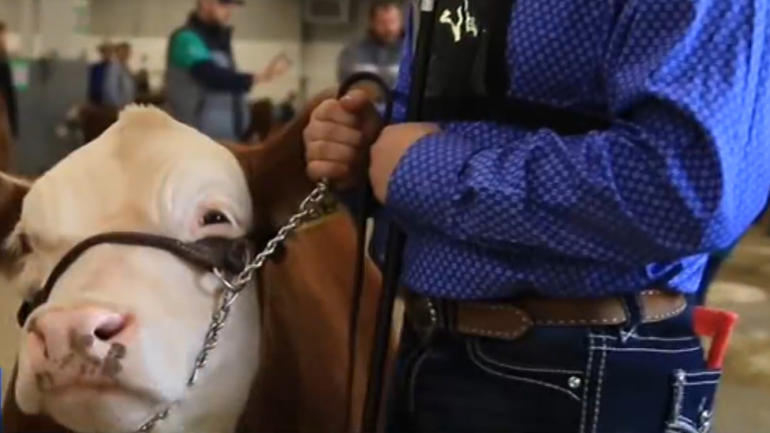The action is fast and furious and sometimes a bit hard to follow. At the National Western Stock Show in Denver, Colorado, three dozen angus bulls are auctioned off to the highest bidders who to an untrained eye can be tough to spot in the arena. We’re told these are very high-quality bulls.
“They are definitely some superior genetics being offered up,” said Mark McCully, American Angus Association C.E.O.
His organization runs the bull sale at which some of the 15,000 head of livestock featured at the annual stock show are shown. The event also includes rodeos, horse shows and lots of shopping.
“In the 16 days of the National Western Stock Show, we generate $120 million of economic impact for the Denver metro area,” said Paul Andrews, National Western Stock Show President and C.E.O.
Many in the farming and ranching industry who traditionally kick off the New Year at the show are eager to turn the page on 2019.
“It’s been tough,” McCully said. “It’s been tough for our cattlemen out there.”
He said harsh weather in the middle of the U.S., a large fire at a packing plant in the state of Kansas and competition from plant-based meat substitutes all tested the cattle industry last year. And then there were tariffs. Tariffs on American beef going into China. Tariffs on a variety of products manufactured in China, like heavy-duty ranch toys on sale at the show that have become a bit more expensive to import.
“Since President Trump initiated these tariffs, three percent or something,” said Mark Brown of Ruff Tuff Ranch Toys, referring to the cost increase. “It’s not huge and we just absorb that rather than pass it into our consumers.”
The sellers of Chinese-made cowboy boots bought in bulk before tariffs went into effect to shield their customers from price hikes that may still be inevitable.
“There’s a fine line to walk between staying competitive with everybody else but it’s going to be more expensive for all our competition as well,” said Cole Edge of Western Edge which sells Western wear.
Meantime, as part of the new trade deal, China has promised to make an additional $32 billion in agricultural purchases from the U.S.
“Government is always going to put either opportunities or obstacles in the way of farmers and ranchers as trade goes,” Andrews said.
“There’s always some uncertainty with these trade agreements and you know it seems like we make some progress in one area and then sometimes have to take a step back in another marketplace,” McCully added.
Brown, who’s run a booth at the stock show for years, said tariffs are simply part of the equation now, leverage he argued to force the rest of the world to play by the rules.
“I like to think that I think we are all on the same page especially in the Western industry here, and in the Western United States,” Brown said.
The cattle industry is banking on stronger demand and higher prices in the year ahead.
“Largely what we find with our U.S. consumer, our global consumer, they love the products, they love beef,” McCully said.
And the animals that provide it, and on this afternoon were a hit with breeders and cattlemen who’ve placed their offers here for the past 81 years.
 CGTN America
CGTN America What it’s like to attend an animal auction
What it’s like to attend an animal auction
